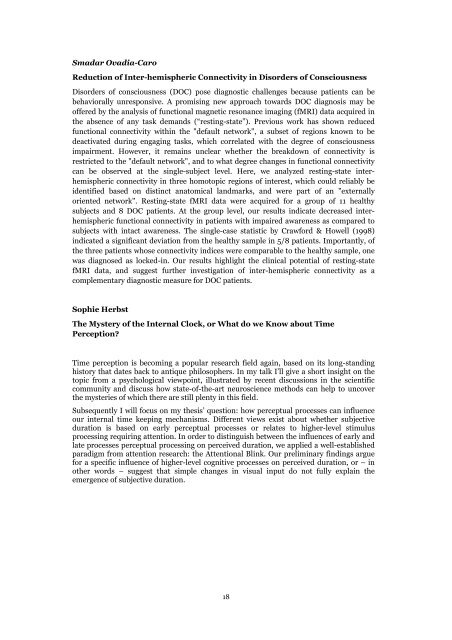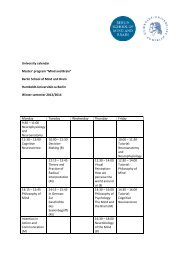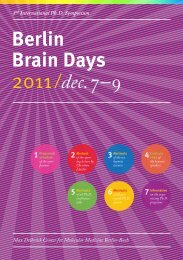Download - Berlin School of Mind and Brain
Download - Berlin School of Mind and Brain
Download - Berlin School of Mind and Brain
Create successful ePaper yourself
Turn your PDF publications into a flip-book with our unique Google optimized e-Paper software.
Smadar Ovadia-Caro<br />
Reduction <strong>of</strong> Inter-hemispheric Connectivity in Disorders <strong>of</strong> Consciousness<br />
Disorders <strong>of</strong> consciousness (DOC) pose diagnostic challenges because patients can be<br />
behaviorally unresponsive. A promising new approach towards DOC diagnosis may be<br />
<strong>of</strong>fered by the analysis <strong>of</strong> functional magnetic resonance imaging (fMRI) data acquired in<br />
the absence <strong>of</strong> any task dem<strong>and</strong>s (“resting-state”). Previous work has shown reduced<br />
functional connectivity within the "default network", a subset <strong>of</strong> regions known to be<br />
deactivated during engaging tasks, which correlated with the degree <strong>of</strong> consciousness<br />
impairment. However, it remains unclear whether the breakdown <strong>of</strong> connectivity is<br />
restricted to the "default network", <strong>and</strong> to what degree changes in functional connectivity<br />
can be observed at the single-subject level. Here, we analyzed resting-state interhemispheric<br />
connectivity in three homotopic regions <strong>of</strong> interest, which could reliably be<br />
identified based on distinct anatomical l<strong>and</strong>marks, <strong>and</strong> were part <strong>of</strong> an "externally<br />
oriented network". Resting-state fMRI data were acquired for a group <strong>of</strong> 11 healthy<br />
subjects <strong>and</strong> 8 DOC patients. At the group level, our results indicate decreased interhemispheric<br />
functional connectivity in patients with impaired awareness as compared to<br />
subjects with intact awareness. The single-case statistic by Crawford & Howell (1998)<br />
indicated a significant deviation from the healthy sample in 5/8 patients. Importantly, <strong>of</strong><br />
the three patients whose connectivity indices were comparable to the healthy sample, one<br />
was diagnosed as locked-in. Our results highlight the clinical potential <strong>of</strong> resting-state<br />
fMRI data, <strong>and</strong> suggest further investigation <strong>of</strong> inter-hemispheric connectivity as a<br />
complementary diagnostic measure for DOC patients.<br />
Sophie Herbst<br />
The Mystery <strong>of</strong> the Internal Clock, or What do we Know about Time<br />
Perception?<br />
Time perception is becoming a popular research field again, based on its long-st<strong>and</strong>ing<br />
history that dates back to antique philosophers. In my talk I’ll give a short insight on the<br />
topic from a psychological viewpoint, illustrated by recent discussions in the scientific<br />
community <strong>and</strong> discuss how state-<strong>of</strong>-the-art neuroscience methods can help to uncover<br />
the mysteries <strong>of</strong> which there are still plenty in this field.<br />
Subsequently I will focus on my thesis’ question: how perceptual processes can influence<br />
our internal time keeping mechanisms. Different views exist about whether subjective<br />
duration is based on early perceptual processes or relates to higher-level stimulus<br />
processing requiring attention. In order to distinguish between the influences <strong>of</strong> early <strong>and</strong><br />
late processes perceptual processing on perceived duration, we applied a well-established<br />
paradigm from attention research: the Attentional Blink. Our preliminary findings argue<br />
for a specific influence <strong>of</strong> higher-level cognitive processes on perceived duration, or – in<br />
other words – suggest that simple changes in visual input do not fully explain the<br />
emergence <strong>of</strong> subjective duration.<br />
18





